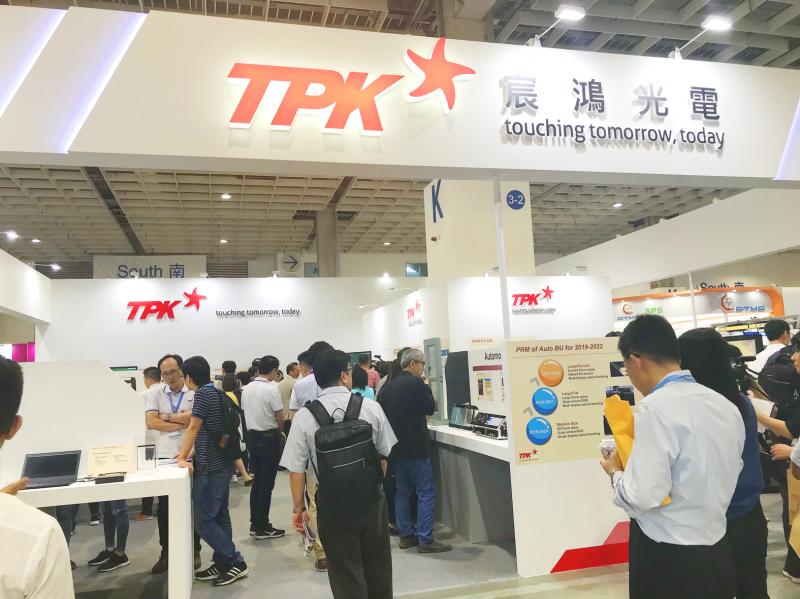Touch module and sensor supplier TPK Holding Co (宸鴻) yesterday gave a dismal revenue outlook for this quarter due to order losses.
Revenue is forecast to slump between 20 and 25 percent from NT$32.85 billion (US$1.14 billion) last quarter, TPK chief strategic officer Freddie Liu (劉詩亮) told investors in a teleconference.
Liu attributed the projected contraction mainly to a dearth of new orders.

Photo: Chen Mei-ying, Taipei Times
“As customers are monitoring how the COVID-19 pandemic will affect sales of end products over the next one to two months, we are conservative about the fourth-quarter outlook,” Liu said. “On top of that, the company is facing a product transition period, meaning new product output will not be as good as before.”
One of TPK’s clients has adjusted its specifications for smartphones and did not place orders for TPK’s touch display lamination services, Liu said.
As a result, TPK expects a continuous decline in revenue from the smartphone segment in the short to medium term, he said.
TPK’s revenue last month dipped 27.2 percent to NT$7.71 billion from NT$10.59 billion in September, and declined 46.7 percent compared with NT$14.48 billion a year earlier, he said.
The smartphone segment is the second-largest revenue source for TPK, making up 34 percent of its total revenue last quarter, a company financial statement showed.
The firm is seeking new business to fill the void over the next few quarters, Liu said.
TPK faces a mounting risk of weakening revenue due to a seasonal downturn, he said.
“The effect of the slow season is usually very severe,” he said.
The company expects to remain profitable this quarter through further improvement in operating efficiency and cost savings, Liu said.
Operating margin is expected to be between 0.5 and 1 percent this quarter, compared with 0.7 percent last quarter, he said.
TPK continues to benefit from growing demand for touch display solutions used in notebook computers and tablets amid remote working and online-learning trends due to the COVID-19 pandemic, TPK chief executive officer Leo Hsieh (謝立群) said.
“The growth momentum for tablets is quite healthy in the fourth quarter, mostly due to the pandemic,” Hsieh said.
The final quarter of the year is usually the peak season for tablets and laptops, he said.
TPK reported that net profit surged about 44 percent quarterly to NT$443 million last quarter, the highest in 10 quarters, boosted by NT$65 million in currency arbitrage gains.
On an annual basis, net profit skyrocketed 93.8 percent from NT$228 million.
Earnings per share jumped to NT$1.09 last quarter from NT$0.76 in the preceding quarter and NT$0.56 a year earlier.
Regular-sized tablets contributed 20 percent to TPK’s revenue last quarter, while notebook computers and larger tablets made up the biggest revenue share of 41 percent, the financial statement showed.

TAKING STOCK: A Taiwanese cookware firm in Vietnam urged customers to assess inventory or place orders early so shipments can reach the US while tariffs are paused Taiwanese businesses in Vietnam are exploring alternatives after the White House imposed a 46 percent import duty on Vietnamese goods, following US President Donald Trump’s announcement of “reciprocal” tariffs on the US’ trading partners. Lo Shih-liang (羅世良), chairman of Brico Industry Co (裕茂工業), a Taiwanese company that manufactures cast iron cookware and stove components in Vietnam, said that more than 40 percent of his business was tied to the US market, describing the constant US policy shifts as an emotional roller coaster. “I work during the day and stay up all night watching the news. I’ve been following US news until 3am

UNCERTAINTY: Innolux activated a stringent supply chain management mechanism, as it did during the COVID-19 pandemic, to ensure optimal inventory levels for customers Flat-panel display makers AUO Corp (友達) and Innolux Corp (群創) yesterday said that about 12 to 20 percent of their display business is at risk of potential US tariffs and that they would relocate production or shipment destinations to mitigate the levies’ effects. US tariffs would have a direct impact of US$200 million on AUO’s revenue, company chairman Paul Peng (彭雙浪) told reporters on the sidelines of the Touch Taiwan trade show in Taipei yesterday. That would make up about 12 percent of the company’s overall revenue. To cope with the tariff uncertainty, AUO plans to allocate its production to manufacturing facilities in

Six years ago, LVMH’s billionaire CEO Bernard Arnault and US President Donald Trump cut the blue ribbon on a factory in rural Texas that would make designer handbags for Louis Vuitton, one of the world’s best-known luxury brands. However, since the high-profile opening, the factory has faced a host of problems limiting production, 11 former Louis Vuitton employees said. The site has consistently ranked among the worst-performing for Louis Vuitton globally, “significantly” underperforming other facilities, said three former Louis Vuitton workers and a senior industry source, who cited internal rankings shared with staff. The plant’s problems — which have not

COLLABORATION: Given Taiwan’s key position in global supply chains, the US firm is discussing strategies with local partners and clients to deal with global uncertainties Advanced Micro Devices Inc (AMD) yesterday said it is meeting with local ecosystem partners, including Taiwan Semiconductor Manufacturing Co (TSMC, 台積電), to discuss strategies, including long-term manufacturing, to navigate uncertainties such as US tariffs, as Taiwan occupies an important position in global supply chains. AMD chief executive officer Lisa Su (蘇姿丰) told reporters that Taiwan is an important part of the chip designer’s ecosystem and she is discussing with partners and customers in Taiwan to forge strong collaborations on different areas during this critical period. AMD has just become the first artificial-intelligence (AI) server chip customer of TSMC to utilize its advanced